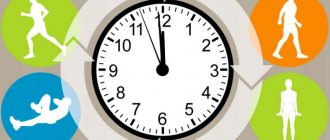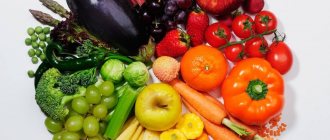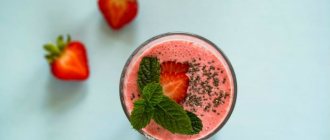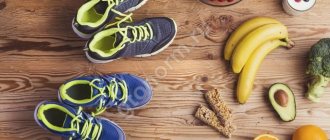How many fruits are there?
I recommend eating fruits under control (in adequate quantities).
There must be a measure (limit) in everything. Golden mean. Eat it if you want, but don’t overdo it.
This rule applies at the stage of mass gain or simply health (for most people).
If your goal is to burn fat, then you should also take them into account (counting calories from fruits).
Later, I will give more advice on this topic (fruits and weight loss), but for now, remember this.
Useful properties of oranges
When answering the question of whether it is possible to lose weight on oranges, it is worth analyzing the beneficial properties of the product. It is used in many diets as a breakfast food. In addition, there is a special diet based on orange juice or fruits.
Fruits provide great health benefits:
- Stimulate metabolic processes and help strengthen the immune system. Therefore, these fruits are often used for illnesses. If you eat half a healthy fruit in the morning, you can maintain excellent health.
- Help fight viral infections. Not every product has these properties.
- Improves stomach function. Even people with peptic ulcers are allowed to drink small amounts of diluted juice. The product also helps relieve constipation.
- Cleanse the body of waste and toxins. Using oranges for weight loss helps remove all excess from the body.
- Improves the functioning of internal organs. The components present in the fruits help normalize blood pressure and improve blood composition. They also help strengthen the endocrine and nervous systems.
- Destroy cancer cells. People who eat fruits every day or drink natural juice from them are much less likely to experience oncology.
- Helps prevent the development of birth defects in children. This feature is associated with a high content of folic acid. Therefore, it is recommended to eat fruits during pregnancy.
- They saturate the body with vitamin C. Therefore, people with bad habits should definitely eat the fruits. They are especially useful for smokers who lose a lot of vitamin C.
When to eat fruit: before or after meals?
Personally, I can eat BEFORE and AFTER (in different cases, in different ways).
Look. The basic rule, if you eat fruit after a meal, is to wait at least 60 minutes.
IMPORTANT: Eating fruit immediately after eating = I do not recommend!
The fact is that if you eat fruit immediately after a full meal = the food will be mixed = and the fruit will begin to ferment and sour, turn into acid and become completely useless.
And in the end, you will only feel fullness and bloating in your stomach, nothing more.
Yes, if you don’t understand, you won’t get anything useful from fruits if you consume them like that.
Therefore, to avoid this problem, wait at least an hour and eat calmly.
Ideally, you should eat fruit 20-30 minutes before your main meals.
During these 20-30 minutes, the fruits will be absorbed and give you maximum nutrients and benefits.
In general, it is absolutely normal to eat fruit whenever you want. But! Consider what I said earlier. These are still scientific observations, and not empty words (because I think so).
Without knowing the simplest rules for eating fruits, you can not only receive less (or even not receive at all) a lot of useful nutrients, but also sometimes harm your body - disrupting digestion, causing fermentation, heartburn, bloating, gas, etc. Draw your own conclusion.
Is it possible to gain weight by eating fruits?
The question is often raised about the fact that fruits contain a lot of sugar. At the same time, the myth that fruits make you lose weight is quite strong. In fact, they do not make you better in a global sense. The purpose of fruit is not to make a person slimmer. They help satisfy hunger and, most importantly, are a source of natural vitamins and microelements. This is their main benefit.
It is important to understand that when it comes to fruits, no matter how healthy they may be, you should not go too far. Everything is good in moderation. For example, if you want to eat an apple in the evening, you can completely afford it. But you just need to eat one fruit, not three. Fruits contain sugar, and they themselves are simple carbohydrates: these substances have a simpler structure, which is why they are processed and absorbed by the body many times faster. If there is a lack of physical activity, then the level of glucose in the blood begins to increase in the body, which then drops sharply and leads to a feeling of hunger. In turn, unused carbohydrates turn into fat. At the same time, their deficiency causes fatigue and drowsiness. Easily digestible carbohydrates should be limited, as they slow down breakdown and participate in the building process, that is, they lead to weight gain. They can also develop an addiction to this product. We must try to control the intake of simple carbohydrates: you should not completely deny yourself them, but it is advisable to limit them. The optimal solution would be to add cereals, berries, freshly squeezed juices, herbal teas and various smoothies to the menu in addition to fruits.
They will gain weight, but not health. Vegetables and fruits with which it is better to be on guard Read more
What form do fruits come in?
I recommend consuming fruits mainly in their natural form.
According to scientific observations = when used in this way = they are most beneficial.
But! This does not mean that you can’t make them, for example, natural freshly squeezed juices, etc. whenever you want... Always remember about the golden mean (in everything) - and then everything will be fine.
But! Everything frozen and especially canned = all out.
As for everything sold in stores, supermarkets, etc. = juices, compotes, jellies, jelly, etc. = that’s all you get from those substances = sugar, preservatives, flavorings, aromas and many more unknown chemical components - but not vitamins and nutrients.
Is it possible to eat oranges at night when losing weight?
A person who is controlling weight or trying to lose weight can have an orange before bed. Eating a low-calorie product has a beneficial effect on health and overall well-being.
A few slices of orange quickly and for a long time provide a feeling of satiety, which will help you refrain from consuming unhealthy foods at night. The orange fiber swells under the influence of gastric juice, fills the space in the intestines, and the person will no longer experience the feeling of hunger.
Dietary fiber from oranges contributes to weight loss to some extent:
- cleanse the intestines of accumulated waste and toxins;
- stimulate intestinal motility;
- normalize stool, eliminate constipation;
- restore intestinal microflora;
- prevent the development of dysbacteriosis;
- accelerate the metabolic process of fat breakdown, thereby preventing the formation of new fat deposits.
Oranges contain increased amounts of folic acid, potassium, and magnesium, which regulate all types of metabolism in the body. Vitamin E in combination with retinol and zinc suppresses appetite, improves skin condition, reduces the appearance of cellulite, and relieves the body of edema.
Orange is valued for weight loss due to the presence of B vitamins. They stimulate the production of hormones responsible for the breakdown of fats, reduce the concentration of cholesterol and sugar in the blood, and support the health of the thyroid gland, dysfunction of which contributes to obesity.
For reference. B vitamins have a beneficial effect on the state of the nervous system, increase resistance to stress, ensure a good mood, normalize night sleep, which in turn allows you not to overeat and get rid of the need to “eat stress.”
Orange contains high doses of vitamin C, which is important for the natural reduction of fatty tissue in the body. Ascorbic acid removes excess cholesterol and sugar, normalizes lipid metabolism, strengthens the immune system, regulates oxidation-reduction reactions, stimulates the secretion of bile, and restores the functions of the pancreas and thyroid gland.
Calorie content and BZHU
The calorie content of orange fruit is 40 kcal, and the protein/fat/carbohydrate content is 0.9 g/0.2 g/8.1 g.
Depending on the variety, weather and climatic conditions of growth, and the degree of ripeness of the fruit, oranges have different chemical compositions.
On average, 100 g of edible part contains:
- organic acids;
- alimentary fiber;
- ash;
- water;
- sugar: glucose, fructose and sucrose;
- vitamin A;
- beta-carotene;
- B vitamins: B1, B2, B3, B4, B5, B6, B9;
- vitamin C;
- vitamin E;
- vitamin H;
- vitamin PP;
- trace elements: iron, iodine, manganese, selenium, cobalt, copper, fluorine, zinc, chromium, molybdenum;
- macroelements: potassium, calcium, silicon, sodium, magnesium, sulfur, phosphorus, chlorine;
- sugars: glucose, fructose, sucrose;
- amino acids: aspartic, glutamic, lysine, glycine, tyrosine, serine, leucine, arginine;
- omega-3 and omega-6 fatty acids.
Why is this so?
Because this distribution of food = will minimize the accumulation of excess fat on the body = as a consequence = avoid disease / premature death.
Well look. During the day, in the first half of the day, most people are usually active.
Accordingly, this activity = consumes the energy received (from food, for example, fruits).
Thanks to this = fat is not deposited on the body = diseases do not occur. Did you catch the chain?
In the evening (after 16.00), most people, as a rule, are already PASSIVE (not so active)!
Accordingly, why does a person need energy during this period of time? To sit at the computer? Lying on the couch, watching TV, and stuff like that... ? It is obvious that this energy is not needed.
Therefore, in the second half of the day (after 15.-16.00) I completely recommend removing carbohydrates! And eat only protein foods (meat, fish, eggs, cottage cheese, etc.)
After all, if energy enters the body = and the person is passive = it (this energy) = will not be wasted (expended), accordingly, excess fat will accumulate, which is not good.
That's why I recommend eating FRUITS = in the first half of the day (before 15.00).
This recommendation is valid both at the stage of gaining muscle mass / and at the stage of burning excess fat (if fruits are still present) / and simply a healthy lifestyle.
The role of fruits in the fight against excess weight
The love of sweets and baked goods often gets in the way of many who want to lose extra pounds and gain weight. And here, fruits come to the rescue, they can not only replace unhealthy treats and baked goods, but also supply the body with energy and healthy vitamins.
Consumption of sweet fruits gives strength, supplies the body with vitamins and improves mood throughout the day. Most fruits contain a mixture of natural sugars, the main one being fructose. Unlike refined sugar, fructose is harmful to health.
Eating only apples or grapefruit is just as harmful. For normal weight loss, the daily diet must include the necessary components: proteins, fats and carbohydrates. Fruits come as an addition to a complete diet.
When else can you eat fruit?
After strength training = eating fruit is also acceptable.
Due to the large amount of energy spent during strength training = fruits will not play any role at all in the accumulation of excess fat (even if the training was in the evening).
Therefore, their use is possible (optional). For example, I very often eat fruit after training (after about 15 minutes). And after another 30-60 minutes = I take a full meal (from carbohydrates, protein).
Best time to eat fruits for people with diabetes
If you have diabetes, foods containing carbohydrates can cause your blood sugar levels to spike. Over time, repeated surges can lead to complications.
Fruits contain carbohydrates, including sugars, and can therefore affect blood sugar levels. However, fruits have a low glycemic index, meaning they have less of an impact on your blood sugar than other foods. This is due to their high fiber content, making them a good choice for people with diabetes.
To reduce the effect of fruit on blood sugar, people with any type of diabetes can combine fruit with other foods or even with foods high in protein or fat. Fiber in the fetus can cause sugars to enter the body's small intestine more slowly ().
Eating fruit separately from meals can cause sugar to enter the bloodstream too quickly.











